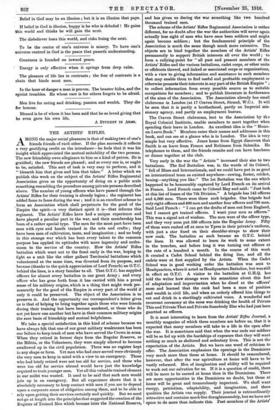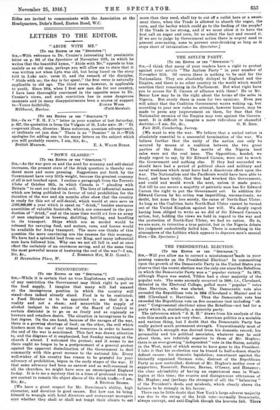THE ARTISTS' RIFLES.
AMONG the major social pleasures is that of making two of one's friends friends of each other. If the plan succeeds it reflects a very gratifying credit on the introducer—he feels that it was his insight which appreciated the mutual suitability of the two persons. The new friendship owes allegiance to him as a kind of patron. He is gratified ; the new friends are pleased ; and so every one is, or ought to be, satisfied. This sort of task is very easy to perform, and it " blesseth him that gives and him that takes." A letter which we publish this week on the subject of the Artists' Rifles Regimental Association gives us the opportunity of doing on a public scale something resembling the procedure among private persons described above. The number of young officers who have passed through the Artists' Rifles for their training is already legion ; the regiment has added fame to fame during the war ; and it is an excellent scheme to form an Association which shall perpetuate for the good of the Empire the spirit—a very distinct spirit it is—that informs this regiment. The Artists' Rifles have had a unique experience and have played a peculiar part in the war, and their membership has been of a rather special type. The men for the most part have been men with eyes and hands trained in the arts and crafts ; they have been men of cultivation, taste, and imagination ; and no body in this strange war which has bent every talent to the common purpose has applied its aptitudes with more ingenuity and enthu- siasm to the service of the country. How the Artists' Rifles battalion which went out to the front early in the war, hoping to fight as a unit like the other gallant Territorial battalions which volunteered at the same time, was diverted from its purpose, and became (thanks to the quick appreciation of Lord French) an O.T.C. behind the lines, is a story familiar to all. That O.T.C. has supplied officers for almost every battalion in our great Army ; and every officer who has gone forth from it has carried with him a proud sense of his military origins, which is a thing that might work per- manently for the good of the Empire in every part of the world if only it could be preserved. The object of the Association is to preserve it. And the opportunity our correspondent's letter gives us is that of helping to bring together again those who were friends during their training but have become sundered, or those who do not yet know one another but have in their common military origins the sure basis of friendship and mutual helpfulness.
We take a special satisfaction in this kind of scheme because we have always felt that one of our great military weaknesses has been our failure to keep track of men who have served the Crown in arms. When they retired in former days from the Regular Reserve, or the Militia, or the Volunteers, they were simply allowed to become swallowed up in the civil population. There was no register kept in any shape or form. Yet men who had once served were obviously the very men to keep in mind with a view to an emergency. Those who had lately retired were not too old for service, and those who were too old for service abroad would have just the knowledge required to train younger men. Yet all this valuable trained element in our midst was wasted. It used to be said that such men would join up in an emergency. But all experience shows that it is absolutely necessary to keep contact with men if you are to depend upon a corporate sense of obligation among them, and to be able to
rely upon getting their services certainly and quickly. But we need not go at length into the principles that suggested the creation of the Register of Trained Men which became later the National Reserve,
and has given us during the war something like two hundred thousand trained men.
The scheme of the Artists' Rifles Regimental Association is rather different, for no doubt after the war the authorities will never again actually lose sight of men who have once been soldiers and might again become soldiers ; but the fundamental principle of the Association is much the same though much more extensive. The objects are to bind together the members of the Artists' Rifles permanently to support British interests all over the world ; to form a rallying-point for " all past and present members of the Artists' Rifles and the various battalions, cadet corps, or other units or offshoots thereof, and linked or associated corps or organizations, with a view to giving information and assistance to such members that may enable them to find useful and profitable employment or otherwise promote their interests in any part of the British Empire " ; to collect information from every possible source as to suitable occupations for members ; and to publish literature in furtherance of the aims of the Association. The Association already has small clubrooms in London (at 17 Craven Street, Strand, W.C.). It will be seen that it is partly a brotherhood, partly an Imperial mis- sionary agency, and partly an employment bureau.
The Craven Street clubrooms, lent to the Association by th e Royal Colonial Institute, enable members to meet together when spending their leave in London. An excellent idea is the " Home- on-Leave Book." Members enter their names and addresses in this book, and can see at a glance who is in London. The idea is very simple but very effective. Jones home from Egypt discovers that Smith is on leave from France and Robinson from Salonika. Ho telephones to them, and the friends reunite and can have luncheon or dinner together at the club.
Very early in the war the " Artists " increased their size to two battalions. The 2nd Battalion was, in the words of its Colonel, " full of Blues and Internationals, and we could have put in as good an international team as existed anywhere—rowing, footer, cricket, boxing—anything you like." The 1st Battalion was the one which happened to be honourably captured by Lord French on its arrival in France. Lord French came to Colonel May and said: "Just look at this list of losses of the 7th Division." A brigade has 143 officers and 4,000 men. There were three such brigades. One brigade had only eight officers and 400 men and another four officers and 700 men. Said Lord French : " I can get the drafts of men out from England, but I cannot get trained officers. I want your men as officers." This was a signal act of wisdom. The men were of the officer type, and they very soon put 550 officers into the Regular Army. Fifty of them were rushed off at once to Ypres in their private's uniform, with just a star fixed on their shoulder-straps to show their new rank. The battalion as such became an O.T.C. behind the lines. It was allowed to learn its work to some extent in the trenches, and before long it was turning out officers at the rate of a hundred a month. In the course of this work it created a Cadet School behind the firing line, and all the cadets were at first supplied by the Artists. When the Cadet School was in good working order the battalion was sent to Headquarters, where it acted as Headquarters Battalion, but was still in effect an O.T.C. A visitor to the battalion at G.H.Q. has told the writer how strange were his sensations about this feat of adaptation and improvisation when he dined at the officers' mess and learned that the cook had been a man of position and wealth in civil life, and when an orderly offered him things to eat and drink in a startlingly cultivated voice. A wonderful and recurrent ceremony at the mess was drinking the health of Private This and Private That and Private Somebody Else who had just been gazetted as officers.
It is most interesting to learn from the Artists' Rifles Journal, a monthly magazine of which three numbers are before us, that it is expected that many members will take to a life in the open after the war. It is sometimes said that when the war ends our soldiers will be so fed up with the hardships of exposure that they will want nothing so much as sheltered and sedentary lives. This is not the expectation of the Artists. But we have one word of criticism to offer. The Association emphasizes the openings in the Dominions very much more than those at home. It should be remembered, however, that after the war agriculture at home will have to be vastly reformed. Men of imagination and ability will be required to work out our salvation for us. If it is a question of credit, there will be more to be earned at home than in the Dominions. There are more opportunities in the Dominions no doubt, but those at home will be great and tremendously important. We shall want energy, patriotism, adaptability, and imagination, and these qualities the Artists can supply. Their journal is extraordinarily attractive and contains much fine draughtsmanship, but we have not space to do more than indicate this. Past members of the Artists'
Rifles are invited to communicate with the Association at the Headquarters, Duke's Road, Boston Road, W.C.



































 Previous page
Previous page